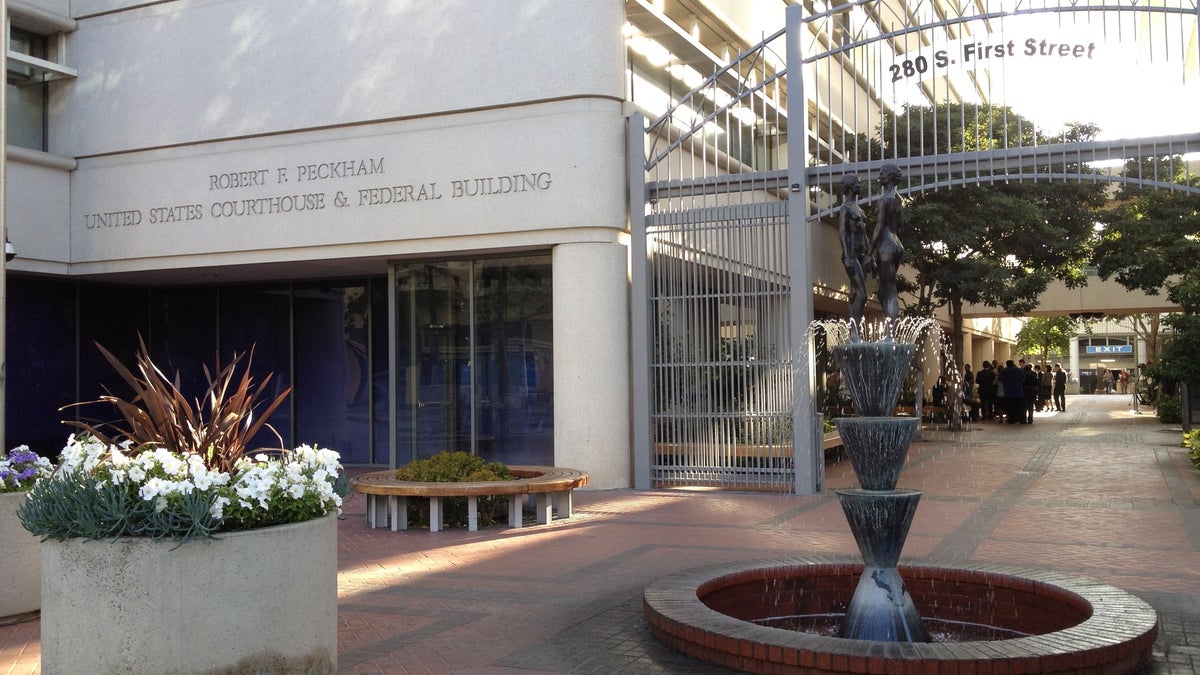Clock ticks down on a verdict in Apple v. Samsung
Nine jurors are holed up in a San Jose, Calif., federal courthouse choosing the more convincing argument in a tech trial worth billions. How long could this go on?

SAN JOSE, Calif. -- After sitting through more than three weeks of complicated and quite often technical testimony, the nine individuals in the celebrated patent infringement dispute pitting Apple against Samsung, now have to pick a victor.
Jurors began deliberating on Wednesday, but barring a surprise, may take some time to reach a decision.
Legal experts caution that unless you're actually in the room watching the process unfold, this is the messiest part of any trial -- almost comparable to trying to get a group of friends to decide on pizza toppings -- and thus and hardest to handicap.
Apple v. Samsung
Important dates in the dispute.
April 15, 2011
Apple files suit against Samsung, asserting patent and trade-dress claims.
June 30, 2011
Samsung files counterclaims against Apple, while Apple asserts
counterclaims of license exhaustion and FRAND/antitrust violations.
July 1, 2011
Apple files a motion for preliminary injunction against the Galaxy S
4G, Infuse 4G, and Droid Charge smartphones, and the Galaxy Tab 10.1 tablet,
which was denied on December 2, 2011.
June 26, 2012
Apple appeals the denial of preliminary injunction to the Federal
Circuit, which affirms on all counts except the D'889 design patent,
which claims the design of a tablet computer. On this day, the court
enters preliminary injunction against the Galaxy Tab 10.1 tablet based on
the D'889 patent.
July 31, 2012
Opening arguments in the trial get under way.
August 21, 2012
Closing arguments delivered from both sides.
August 22, 2012
Jury begins deliberation.
"There are invariably compromises and sales pitches to one another," said one trial expert who asked to remain unidentified.
Even before the horse-trading, the jurors have to grapple with a verdict form that spans 20 pages and asks them to select which products from which company infringe on particular patent claims. Complicating the matter is that three of Samsung's corporate arms are accused, but not for all products, meaning jurors could come down on some, but perhaps not all the parts of the company on any given device.
"Typically juries in infringement cases take anywhere from a few hours to half a day, but this one clearly has a lot more products at issue," says Pierre Yanney, a patent litigation partner with Stroock & Stroock & Lavan. "The more complicated you make things, the less understandable it is."
Complicated is just one of the words that sums up the battle between the two companies, which began with a lawsuit last April. Apple sued Samsung for copying the look and feel of its products, with Samsung suing Apple right back two months later over patent infringement. This trial wrapped both of those cases in one, somehow squeezing together the patent infringement issues, alongside antitrust claims, and even trade dress issues.
According to Dr. Kevin Boully of Persuasion Strategies, who has experience interviewing jurors post-trial as well as conducting hundreds of mock jury deliberations, one of the main things people try to do is simplify the task at hand.
"What they're looking for is a few things, including a system for answering the verdict questions, a way to resolve the gut decisions with the questions they have to answer, and ways to shortcut the technical details to come up with a decision that feels right," Boully said.
That initial part of breaking things down into the basics is the norm, Boully said.
"When it comes to some of the more technical aspects -- the patent language, the patent claims -- there's going to be a sea of complexity," he said. "What we commonly see is that [jurors] grab onto something they can understand, probably something simple as comparison of products."
That comparison work has already been done for jurors, in part from evidence delivered by both sides. In Apple's case, the company has painted the picture -- in slide form -- that Samsung wasn't making anything that looked remotely like the iPhone or iPad until both of those products launched.
For Samsung, it's been a matter of pointing to internal documents showing it was at work on touch-screen phones with giant rectangular screens and rounded corners well before Apple showed up. That argument, which was also presented as a slide during the trial, runs parallel with Samsung's use of prior art to undercut Apple's patents.
One thing that's for sure is that jurors will have plenty of hands-on opportunities with the accused gadgets. Both sides provided working versions of the devices, from cell phones to the tablets, so that the jury could see how they looked and operated from something more than a presentation slide.
When jurors are done with infringements, there's the task of calculating damages, which range from millions to billions depending on which side you're on. Apple wants $2.75 billion from Samsung based on what Apple lawyer Harold McElhinny referred to during the company's closing arguments as $8 billion worth of iPhone and iPad "knockoffs."
Things can drag on, however. For recent proof of that, look no further than the antitrust case between Rambus and Micron Technology and Hynix Semiconductor. That trial, which ran three full months before wrapping up last November, required more than eight weeks of deliberations. However nobody CNET spoke with believed it would be that long in Apple v. Samsung.
For its part, the jury today is going into overtime. In a note this morning, the group said they'd be deliberating until 5:30 p.m. versus the usual 4:30 p.m. end of day. That move could suggest that they're getting close, according to another legal professional who preferred not to be named.
"It's getting towards the end of the week, and they don't want to have to worry about this over the weekend," this person said.
Complete coverage: Apple v. Samsung, a battle over billions

